2024届高考英语听力复习精听与泛听2课件(共26张PPT 内嵌音频)
文档属性
| 名称 | 2024届高考英语听力复习精听与泛听2课件(共26张PPT 内嵌音频) |  | |
| 格式 | pptx | ||
| 文件大小 | 3.5MB | ||
| 资源类型 | 教案 | ||
| 版本资源 | 人教版(2019) | ||
| 科目 | 英语 | ||
| 更新时间 | 2023-12-22 12:08:52 | ||
图片预览

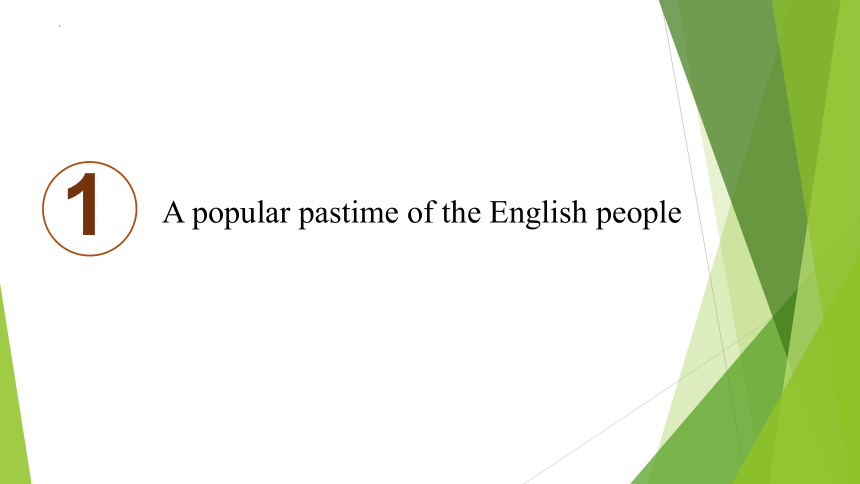
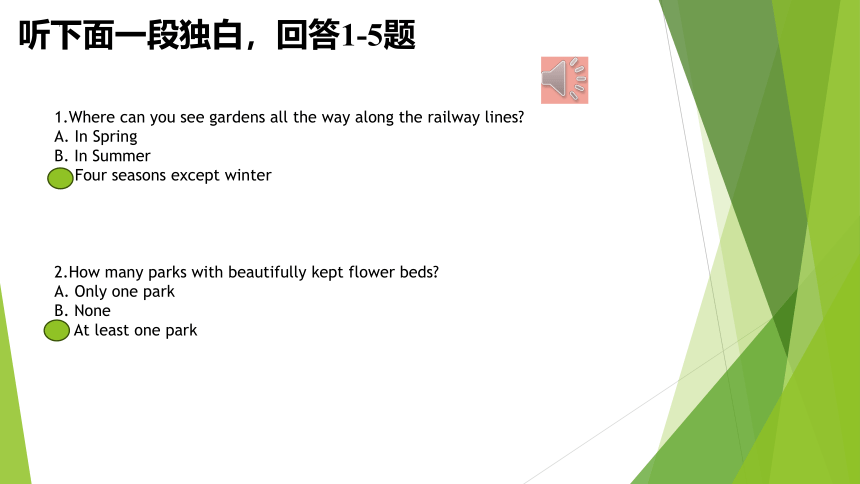
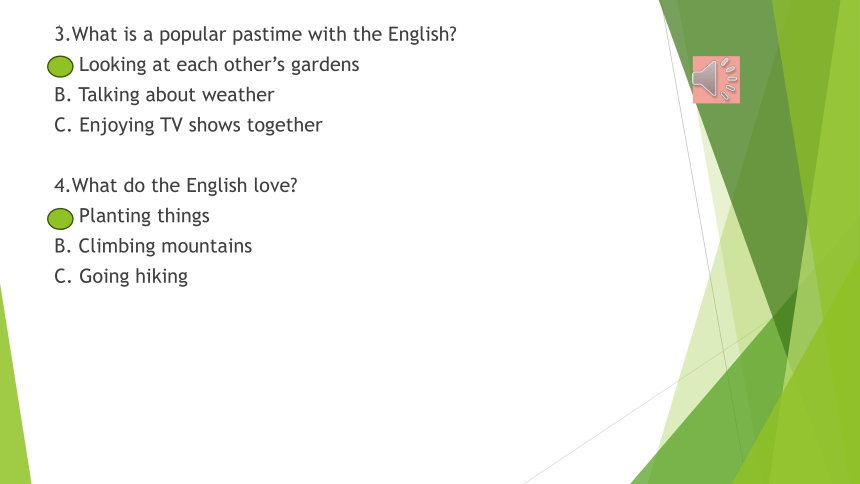

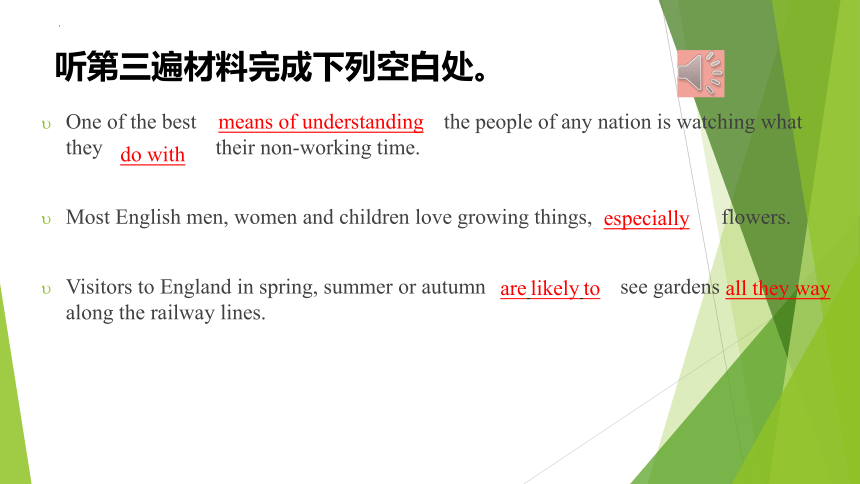
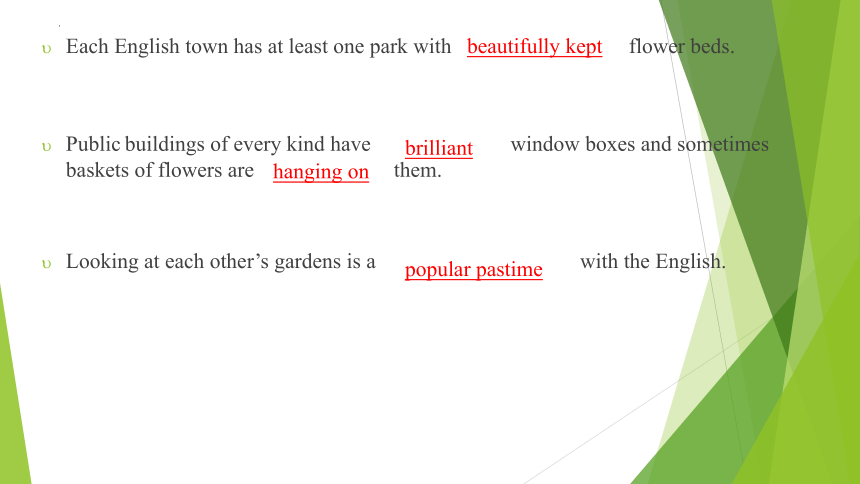
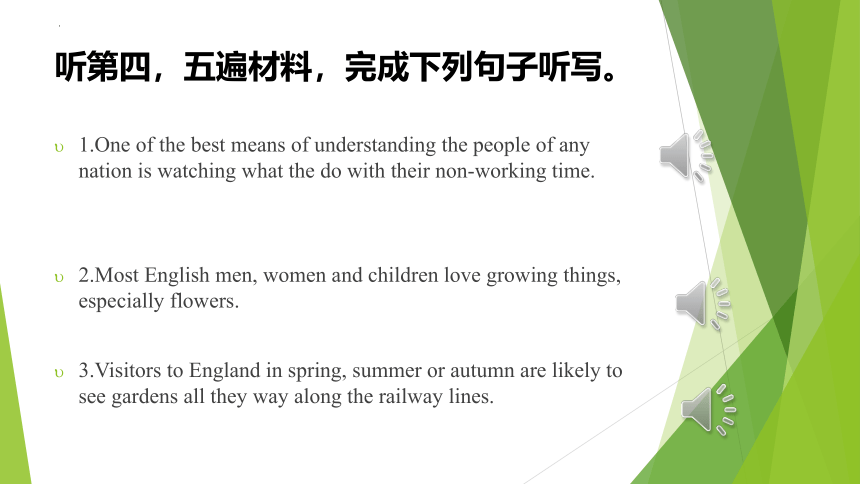
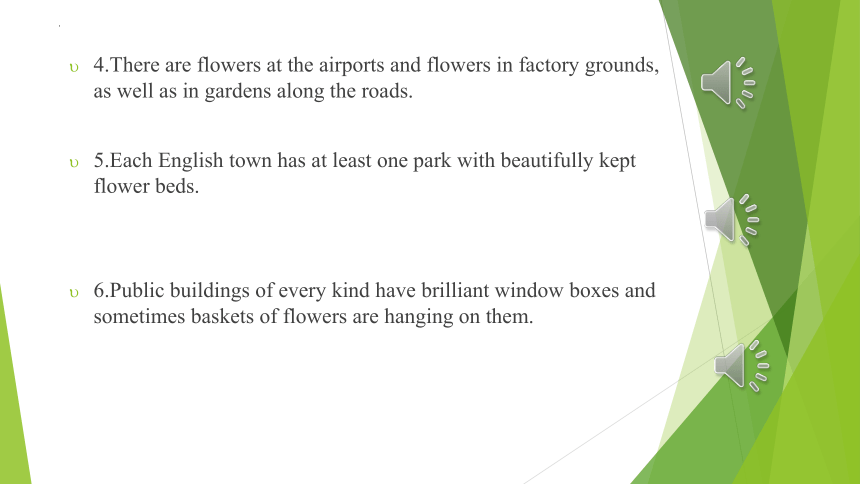
文档简介
(共26张PPT)
高考听力复习精听与泛听2
适用于高中各个年级
A popular pastime of the English people
1
听下面一段独白,回答1-5题
1.Where can you see gardens all the way along the railway lines
A. In Spring
B. In Summer
C. Four seasons except winter
2.How many parks with beautifully kept flower beds
A. Only one park
B. None
C. At least one park
3.What is a popular pastime with the English
A. Looking at each other’s gardens
B. Talking about weather
C. Enjoying TV shows together
4.What do the English love
A. Planting things
B. Climbing mountains
C. Going hiking
听第二遍材料,完成第1,2两题
1.What is the best means of understanding the people of any nation
It is watching what they do with their non-working time.
2.What do the English enjoy most
They enjoy growing things themselves most.
One of the best the people of any nation is watching what they their non-working time.
Most English men, women and children love growing things, flowers.
Visitors to England in spring, summer or autumn see gardens along the railway lines.
听第三遍材料完成下列空白处。
means of understanding
do with
especially
are likely to
all they way
Each English town has at least one park with flower beds.
Public buildings of every kind have window boxes and sometimes baskets of flowers are them.
Looking at each other’s gardens is a with the English.
beautifully kept
brilliant
hanging on
popular pastime
1.One of the best means of understanding the people of any nation is watching what the do with their non-working time.
2.Most English men, women and children love growing things, especially flowers.
3.Visitors to England in spring, summer or autumn are likely to see gardens all they way along the railway lines.
听第四,五遍材料,完成下列句子听写。
4.There are flowers at the airports and flowers in factory grounds, as well as in gardens along the roads.
5.Each English town has at least one park with beautifully kept flower beds.
6.Public buildings of every kind have brilliant window boxes and sometimes baskets of flowers are hanging on them.
7.But what the English enjoy most is growing things themselves.
8.If it is impossible to have a garden, then a window box or something growing in a pot will do.
9.Looking at each other’s gardens is a popular pastime with the English.
3. A Popular Pastime of the English People
One of the best means of understanding the people of any nation is watching what they do with their non-working time.
Most English men, women and children love growing things, especially flowers. Visitors to England in spring, summer or autumn are likely to see gardens all they way along the railway lines. There are flowers at the airports and flowers in factory grounds, as well as in gardens along the roads. Each English town has at least one park with beautifully kept flower beds. Public buildings of every kind have brilliant window boxes and sometimes baskets of flowers are hanging on them.
But what the English enjoy most is growing things themselves. If it is impossible to have a garden, then a window box or something growing in a pot will do. Looking at each other’s gardens is a popular pastime with the English.
British and American police office
2
听下面一段独白,回答1-4题
1.What is the first difference between real life and life on TV
A. They deal with the law in reality.
B. They actually look more serious and careful.
C. They are really busy and tired.
2.What is most of their time spent in
A. Talking with beautiful girls.
B. Bravely facing cruel criminals.
C. Arranging millions of words.
3.What is the author’s attitude towards real policemen’s life
A. Favorable
B. Indifferent
C. Objective
4.Why do they need to know so much law
A. They can learn it well.
B. They have to put it into work.
C. They think it interesting.
听第二遍材料,完成第1,2两题
is that a policeman’s real life the law.
Most of what he learns is the law. He has to know actually what actions are against the law and what facts can prove them in court.
He has to know nearly as much law as a lawyer, and what’s more, he has to on his feet, and, running down after someone he wants to
The first difference
deals with
be used to
put it into practice
in the dark
a narrow street
talk to.
He will spend most of his working life of words on forms about sad, ordinary people who are --- or not of , unimportant crimes.
听第三遍材料完成下列空白处。
arranging millions
thousands of
hundreds of
guilty
stupid
1.Real policemen, both in Britain and the U.S., hardly recognize any common points between their lives
2.and what they se on TV—if they ever get home in time.
3.Some things are almost the same, of course, but the policemen do not think much of them.
4.The first difference is that a policeman’s real life deals with the law.
5.Most of what he learns is the law.
听第四,五遍材料,完成下列句子听写。
6.He has to know actually what actions are against the law and what facts can be used to prove them in court.
7.He has to know nearly as much law as a lawyer,
8.and what’s more, he has to put it into practice on his feet, in the dark
9.and, running down a narrow street after someone he wants to talk to.
10..Little of his time is spent in talking with beautiful girls or in bravely facing cruel criminals.
11.He will spend most of his working life arranging millions of words on thousands of forms about hundreds of sad, ordinary people
12. who are guilty--- or not of stupid, unimportant crimes.
4. British and American Police Officers
Real policemen, both in Britain and the U.S., hardly recognize any common points between their lives and what they se on TV—if they ever get home in time.
Some things are almost the same, of course, but the policemen do not think much of them.
The first difference is that a policeman’s real life deals with the law. Most of what he learns is the law. He has to know actually what actions are against the law and what facts can be used to prove them in court. He has to know nearly as much law as a lawyer, and what’s more, he has to put it into practice on his feet, in the dark and, running down a narrow street after someone he wants to talk to.
Little of his time is spent in talking with beautiful girls or in bravely facing cruel criminals. He will spend most of his working life arranging millions of words on thousands of forms about hundreds of sad, ordinary people who are guilty--- or not of stupid, unimportant crimes.
短对话训练
3
1.What is the charge for breakfast at the moment
A. $3.
B. $2.50.
C. $2
(Text 1)
M:Do the changes for meals stay the same
W: No.Lunch and dinner are unchanged, still $3. We’ve had to increase the charge for breakfast. It’s $ 2.50. It used tobe $ 2
2. How did the woman read the book
A. She read through it.
B. She read the front chapters.
C. She read the chapters that interested her.
(Test2)
M: Have you read the whole book since noon loday
W:oh, I haven’t read it straight through the way you’d read a novel. A few chapters were on the topic that interested me,so l just read those.
3.What does the woman mean
A. Susan’s house is nearby.
B. Susan gave them the wrong directions.
C. She and the man will probably be late for lunch.
(Text3)
M:This looks like the way to Susan's house, but I don't know. I wish l'd written down the directions.
W:At this rate, we won’t get there in time for lunch.
4. Where does the conversation take place
A. In a shop.
B. In a taxi.
C. On a plane.
W: There are roadworks up by the entrance to the airport. You can drop me off here. Well, how much is the fare
M: Six pounds thirty.
W:I only have a twenty-pound note. Do you have change
M: Yeah.
5. What are the speakers talking about
A. Preparation for a trip.
B. A school day.
C.A final exam.
(Text5)
W: The exam is finally over. Our school camping trip is coming. I think we should prepare for it.
M-OK We need to buy some bread, cook pots, spoons, plates, cups, and so on. We’d better make a list
W: Good idea.
高考听力复习精听与泛听2
适用于高中各个年级
A popular pastime of the English people
1
听下面一段独白,回答1-5题
1.Where can you see gardens all the way along the railway lines
A. In Spring
B. In Summer
C. Four seasons except winter
2.How many parks with beautifully kept flower beds
A. Only one park
B. None
C. At least one park
3.What is a popular pastime with the English
A. Looking at each other’s gardens
B. Talking about weather
C. Enjoying TV shows together
4.What do the English love
A. Planting things
B. Climbing mountains
C. Going hiking
听第二遍材料,完成第1,2两题
1.What is the best means of understanding the people of any nation
It is watching what they do with their non-working time.
2.What do the English enjoy most
They enjoy growing things themselves most.
One of the best the people of any nation is watching what they their non-working time.
Most English men, women and children love growing things, flowers.
Visitors to England in spring, summer or autumn see gardens along the railway lines.
听第三遍材料完成下列空白处。
means of understanding
do with
especially
are likely to
all they way
Each English town has at least one park with flower beds.
Public buildings of every kind have window boxes and sometimes baskets of flowers are them.
Looking at each other’s gardens is a with the English.
beautifully kept
brilliant
hanging on
popular pastime
1.One of the best means of understanding the people of any nation is watching what the do with their non-working time.
2.Most English men, women and children love growing things, especially flowers.
3.Visitors to England in spring, summer or autumn are likely to see gardens all they way along the railway lines.
听第四,五遍材料,完成下列句子听写。
4.There are flowers at the airports and flowers in factory grounds, as well as in gardens along the roads.
5.Each English town has at least one park with beautifully kept flower beds.
6.Public buildings of every kind have brilliant window boxes and sometimes baskets of flowers are hanging on them.
7.But what the English enjoy most is growing things themselves.
8.If it is impossible to have a garden, then a window box or something growing in a pot will do.
9.Looking at each other’s gardens is a popular pastime with the English.
3. A Popular Pastime of the English People
One of the best means of understanding the people of any nation is watching what they do with their non-working time.
Most English men, women and children love growing things, especially flowers. Visitors to England in spring, summer or autumn are likely to see gardens all they way along the railway lines. There are flowers at the airports and flowers in factory grounds, as well as in gardens along the roads. Each English town has at least one park with beautifully kept flower beds. Public buildings of every kind have brilliant window boxes and sometimes baskets of flowers are hanging on them.
But what the English enjoy most is growing things themselves. If it is impossible to have a garden, then a window box or something growing in a pot will do. Looking at each other’s gardens is a popular pastime with the English.
British and American police office
2
听下面一段独白,回答1-4题
1.What is the first difference between real life and life on TV
A. They deal with the law in reality.
B. They actually look more serious and careful.
C. They are really busy and tired.
2.What is most of their time spent in
A. Talking with beautiful girls.
B. Bravely facing cruel criminals.
C. Arranging millions of words.
3.What is the author’s attitude towards real policemen’s life
A. Favorable
B. Indifferent
C. Objective
4.Why do they need to know so much law
A. They can learn it well.
B. They have to put it into work.
C. They think it interesting.
听第二遍材料,完成第1,2两题
is that a policeman’s real life the law.
Most of what he learns is the law. He has to know actually what actions are against the law and what facts can prove them in court.
He has to know nearly as much law as a lawyer, and what’s more, he has to on his feet, and, running down after someone he wants to
The first difference
deals with
be used to
put it into practice
in the dark
a narrow street
talk to.
He will spend most of his working life of words on forms about sad, ordinary people who are --- or not of , unimportant crimes.
听第三遍材料完成下列空白处。
arranging millions
thousands of
hundreds of
guilty
stupid
1.Real policemen, both in Britain and the U.S., hardly recognize any common points between their lives
2.and what they se on TV—if they ever get home in time.
3.Some things are almost the same, of course, but the policemen do not think much of them.
4.The first difference is that a policeman’s real life deals with the law.
5.Most of what he learns is the law.
听第四,五遍材料,完成下列句子听写。
6.He has to know actually what actions are against the law and what facts can be used to prove them in court.
7.He has to know nearly as much law as a lawyer,
8.and what’s more, he has to put it into practice on his feet, in the dark
9.and, running down a narrow street after someone he wants to talk to.
10..Little of his time is spent in talking with beautiful girls or in bravely facing cruel criminals.
11.He will spend most of his working life arranging millions of words on thousands of forms about hundreds of sad, ordinary people
12. who are guilty--- or not of stupid, unimportant crimes.
4. British and American Police Officers
Real policemen, both in Britain and the U.S., hardly recognize any common points between their lives and what they se on TV—if they ever get home in time.
Some things are almost the same, of course, but the policemen do not think much of them.
The first difference is that a policeman’s real life deals with the law. Most of what he learns is the law. He has to know actually what actions are against the law and what facts can be used to prove them in court. He has to know nearly as much law as a lawyer, and what’s more, he has to put it into practice on his feet, in the dark and, running down a narrow street after someone he wants to talk to.
Little of his time is spent in talking with beautiful girls or in bravely facing cruel criminals. He will spend most of his working life arranging millions of words on thousands of forms about hundreds of sad, ordinary people who are guilty--- or not of stupid, unimportant crimes.
短对话训练
3
1.What is the charge for breakfast at the moment
A. $3.
B. $2.50.
C. $2
(Text 1)
M:Do the changes for meals stay the same
W: No.Lunch and dinner are unchanged, still $3. We’ve had to increase the charge for breakfast. It’s $ 2.50. It used tobe $ 2
2. How did the woman read the book
A. She read through it.
B. She read the front chapters.
C. She read the chapters that interested her.
(Test2)
M: Have you read the whole book since noon loday
W:oh, I haven’t read it straight through the way you’d read a novel. A few chapters were on the topic that interested me,so l just read those.
3.What does the woman mean
A. Susan’s house is nearby.
B. Susan gave them the wrong directions.
C. She and the man will probably be late for lunch.
(Text3)
M:This looks like the way to Susan's house, but I don't know. I wish l'd written down the directions.
W:At this rate, we won’t get there in time for lunch.
4. Where does the conversation take place
A. In a shop.
B. In a taxi.
C. On a plane.
W: There are roadworks up by the entrance to the airport. You can drop me off here. Well, how much is the fare
M: Six pounds thirty.
W:I only have a twenty-pound note. Do you have change
M: Yeah.
5. What are the speakers talking about
A. Preparation for a trip.
B. A school day.
C.A final exam.
(Text5)
W: The exam is finally over. Our school camping trip is coming. I think we should prepare for it.
M-OK We need to buy some bread, cook pots, spoons, plates, cups, and so on. We’d better make a list
W: Good idea.
